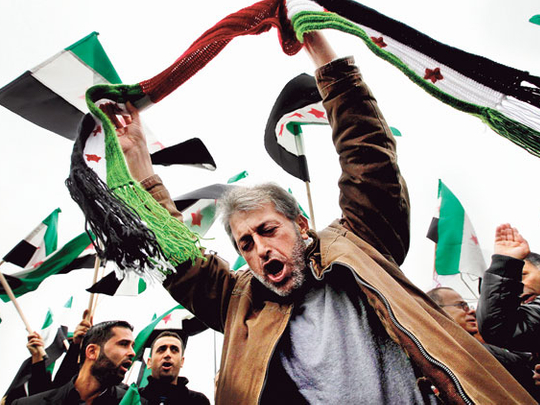
Beirut: The death of a French journalist in Syria brings new calls for an independent investigation of the violence in the country, following a series of mysterious attacks since December that have killed scores of people despite the presence of Arab League monitors.
The prospects for such an independent probe are slim in Syria, where the government has barred access by most foreign media except on escorted trips. The Arab League observer mission has been beset by problems and itself criticised as merely providing cover for the regime's crackdown on dissent.
Help from the UN is unlikely, in part because Syrian allies Russia and China are blocking action against Damascus.
Humanitarian aid has been turned away, as well. On Thursday, Syrian authorities barred hundreds of people from entering the country from Turkey to deliver medicine, food and other aid.
The French government, human rights groups and Syria's opposition demanded an inquiry into the death on Wednesday of Gilles Jacquier, 43, in a barrage of grenades in the restive city of Homs.
The award-winning correspondent for France-2 Television was the first Western journalist killed in the 10-month-old uprising. "The killing of the French journalist raises a number of questions - who launched the attacks, what was the purpose?" Nadim Houry, a senior researcher at Human Rights Watch, told The Associated Press.
"So at this point, what's important is again to launch a credible investigation." The governor of Homs formed a committee to investigate Jacquier's killing, the state-run news agency said. But observers say the probe should be international.
Thousands of people, most believed to be unarmed protesters, have been killed in the 10-month-old revolt against President Bashar Al Assad. But Jacquier's death, along with three suicide bombings in the capital of Damascus since December 23, have added a new dimension to a conflict that already has brought the country to the verge of civil war.
The government has blamed the three attacks on "terrorists" and said the violence proves that a foreign conspiracy is behind the uprising, not peaceful protesters - a narrative the government has maintained since the start of the revolt against Assad's authoritarian regime.
The opposition contends forces loyal to the government are behind the bloodshed as a way to tarnish the uprising. They say the brazen attacks are a sign of an increasingly desperate government that needs to terrify Syrians into submission.
In the course of the uprising, Al Assad has portrayed himself as the only force to prevent chaos and the kind of sustained violence that has been so destructive in neighboring Iraq and Lebanon.
"The journalists were attacked in a heavily militarized regime stronghold. It would be hugely difficult for any armed opposition to penetrate the area and launch such a deadly attack," said Wissam Tarif, a campaigner for online global activist group, Avaaz.
Syria has only recently started issuing short-term visas for a limited number of journalists, who must be accompanied by government minders. Local reporters work under heavy restrictions.
Jacquier was among a group of 15 journalists on the government trip when they were hit by the grenades" up to eight Syrian civilians also were reported killed. Video posted online appeared to show the aftermath of the attack, with pools of fresh blood in the street and people frantically loading the injured into cars.
Jacquier's colleagues at France-2 said "his courage and his journalistic values earned our admiration." Jacquier was the 2003 recipient of France's Prix Albert Londres, a prestigious reporting award, as well as the 2010 Prix Bayeux for war correspondents.
The opposition called for protests Thursday in his honour, and activists said hundreds of people demonstrated across the country in cold and rainy weather, demanding Assad's downfall.
During the uprising, several Syrian journalists have been killed or tortured as they tried to cover the revolt, which has proven the most serious challenge to the Al Assad family's 40-year dynasty.












